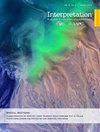Anomalous elastic properties of mudrocks bounding reservoirs with high concentrations of naturally occurring CO2
IF 1.1
4区 地球科学
Q3 GEOCHEMISTRY & GEOPHYSICS
Interpretation-A Journal of Subsurface Characterization
Pub Date : 2023-03-28
DOI:10.1190/int-2022-0115.1
引用次数: 0
Abstract
Very high concentrations of CO2 have been encountered in solution as carbonic acid in hydrocarbon reservoirs in parts of the Greater Sarawak Basin, offshore Borneo, Malaysia. Concentrations can exceed 80%. Anomalous features in 3D seismic data also are found in areas with high CO2 concentrations. These features appear as halos around reservoirs, cutting across stratigraphy and indicating a hardening of the nonreservoir rocks within the envelope of the halo. These halos can extend for hundreds of meters above and below a reservoir. Elastic log data from wells that pass through and adjacent to these seismic anomalies indicate that mudrocks within the anomalies have higher densities and velocities than would be predicted from locally derived compaction trends. Combinable magnetic resonance measurements indicate that the anomalous properties are the result of lower-than-expected capillary-bound microporosities. It is proposed that carbonic acid in the reservoir fluids diffuses into the bounding rocks, causing a loss of porosity. The amount of porosity lost depends on the clay content of the mudrock and the initial level of compaction, with shallower, more clay-rich shales able to lose more porosity. The anomalous seismic signatures result from a sharp transition (over approximately 5 m) at the diagenetic front between normal and altered rocks. The alteration can significantly change the amplitude variation with offset response of the reservoirs and therefore the ability to correctly predict fluid phase and reservoir quality. No anomalies are observed when the concentration of CO2 in the reservoir is less than 10% but always present when CO2 exceeds 20%. Therefore, it is possible to map the general distribution of high CO2 concentration from seismic data. There is no indication that the scale, amplitude, or shape of the anomalies gives an indication of the concentration of CO2.高浓度天然CO2储层边界泥岩的异常弹性特性
马来西亚婆罗洲近海大砂拉越盆地部分地区的碳氢化合物储层中,溶液中二氧化碳浓度非常高。浓度可能超过80%。在二氧化碳浓度高的地区也发现了三维地震数据中的异常特征。这些特征表现为储层周围的晕圈,贯穿地层,表明晕圈范围内的非储层岩石硬化。这些光晕可以在水库上方和下方延伸数百米。通过这些地震异常并与之相邻的井的弹性测井数据表明,异常内的泥岩密度和速度高于根据局部推导出的压实趋势预测的密度和速度。可组合的磁共振测量表明,异常性质是毛细管结合微孔比预期低的结果。有人提出,储层流体中的碳酸扩散到围岩中,导致孔隙度损失。孔隙度的损失量取决于泥岩的粘土含量和初始压实水平,较浅、富含粘土的页岩能够损失更多的孔隙度。异常地震特征是由正常岩石和蚀变岩石之间成岩前缘的急剧过渡(超过约5m)引起的。蚀变可以显著改变储层的振幅随偏移响应的变化,从而改变正确预测液相和储层质量的能力。当储层中的CO2浓度低于10%时没有观察到异常,但当CO2超过20%时总是存在异常。因此,可以根据地震数据绘制高CO2浓度的总体分布图。没有迹象表明异常的规模、幅度或形状可以表明二氧化碳的浓度。
本文章由计算机程序翻译,如有差异,请以英文原文为准。
求助全文
约1分钟内获得全文
求助全文
来源期刊

Interpretation-A Journal of Subsurface Characterization
GEOCHEMISTRY & GEOPHYSICS-
CiteScore
2.50
自引率
8.30%
发文量
126
期刊介绍:
***Jointly published by the American Association of Petroleum Geologists (AAPG) and the Society of Exploration Geophysicists (SEG)***
Interpretation is a new, peer-reviewed journal for advancing the practice of subsurface interpretation.
 求助内容:
求助内容: 应助结果提醒方式:
应助结果提醒方式:


